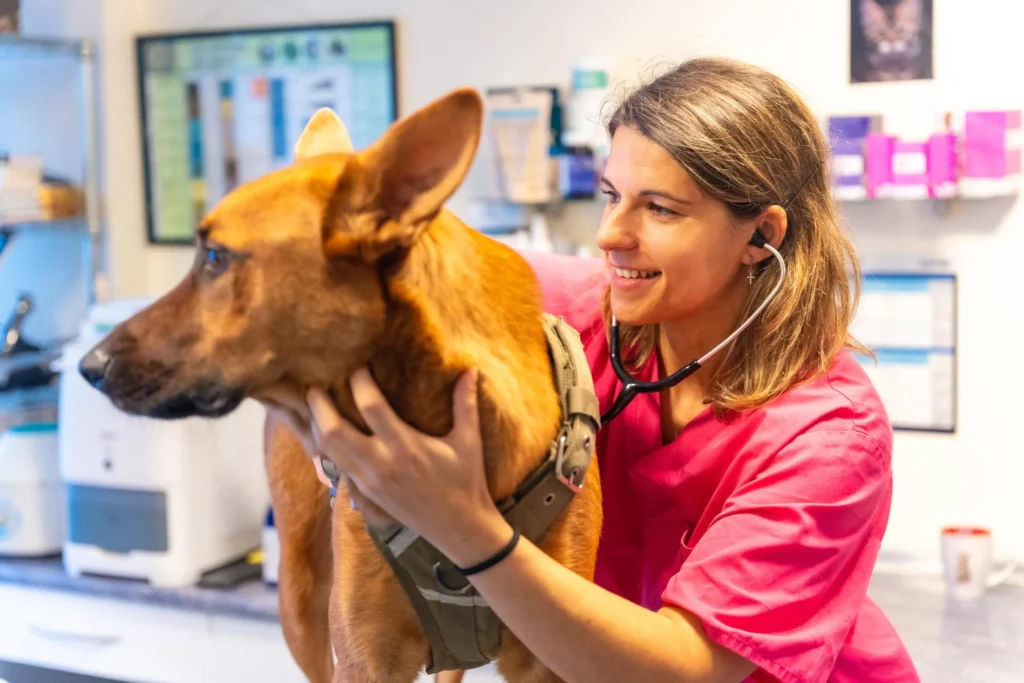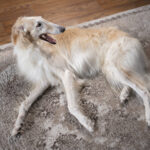
Contents
If your dog suddenly develops a dry, hacking cough, it might not just be a simple cold. The problem could be kennel cough in dogs, a common illness that spreads easily when dogs are around each other. While it often sounds alarming, the good news is that with the right care and timely kennel cough treatment for dogs, most dogs recover quickly.
In this blog, we’ll explain the key symptoms to watch for, the most effective treatment options. Let’s dive into how you can protect your dog’s health and prevent this pesky illness from turning into something more serious.
What Is Kennel Cough in Dogs?
Kennel cough is a common illness that affects a dog’s breathing. It’s very contagious and spreads quickly when dogs are close to each other, like in dog parks, kennels, or grooming salons. The sickness is usually caused by a mix of germs—most often a bacteria called Bordetella bronchiseptica along with viruses like parainfluenza or adenovirus.
Dogs with kennel cough usually develop a rough, hacking cough and may also have a runny nose or other cold-like symptoms. While it often looks mild at first, if left untreated it can turn into more serious problems, such as pneumonia.
Symptoms of Kennel Cough in Dogs
Coughing
The first and most common sign of kennel cough is a strong, dry, and hacking cough. It often sounds like your dog is trying to clear their throat. The cough can come in bursts, worsen at night, or after physical activity. In some cases, it may be followed by gagging or small amounts of mucus. While the cough might seem harmless at first, if it continues for several days, it’s important to consult your vet to rule out anything serious.
Tiredness and Low Energy
Dogs battling kennel cough often lose interest in their usual activities. You may notice they don’t want to run, play, or even go for walks. This low energy is the body’s way of conserving strength to fight off the infection. Rest helps, but if your dog remains unusually sluggish for several days, a veterinary checkup is needed to ensure the illness isn’t worsening.
Loss of Appetite and Fever
Illness often affects a dog’s appetite. A dog with kennel cough may stop eating as much or even refuse meals altogether. A mild fever can also develop, which adds to their discomfort and weakness. If your dog skips food and water for more than a day, consult your vet, since lack of nutrition and hydration can slow recovery and weaken the immune system.
Runny Nose and Worsening Symptoms
As kennel cough progresses, you may notice additional symptoms such as nasal discharge, watery eyes, or louder coughing spells. These signs suggest the infection is becoming more serious and could develop into pneumonia if not treated. At this stage, immediate veterinary attention is strongly advised.
Causes of Kennel Cough in Dogs
Kennel cough is not caused by just one germ but usually a combination. The most common bacterial cause is Bordetella bronchiseptica. Viruses like parainfluenza and adenovirus also play a major role. These germs spread easily in places where dogs are close together, such as dog parks, kennels, and grooming salons.
When inhaled, these bacteria and viruses irritate the lining of the airways and lungs. The irritation causes inflammation, which leads to the classic hacking cough. In some cases, multiple germs attack at the same time, making the illness more severe and harder to treat.
How Vets Diagnose Kennel Cough
Physical Check
A vet usually begins with a physical exam. By listening to the cough and checking your dog’s breathing, they can often identify kennel cough based on its distinct sound.
Additional Tests
If the cough is severe or your dog has other symptoms, the vet may suggest X-rays to check the lungs for pneumonia, or swab samples to confirm which bacteria or viruses are causing the illness. These tests help the vet decide the best treatment plan for your dog.
Treatment of Kennel Cough in Dogs
Mild Cases
Most cases of kennel cough are mild and clear up in 1–2 weeks. Care focuses on keeping your dog comfortable:
- Cough medicine may be prescribed to reduce coughing fits.
- Humidifiers or steam therapy (like sitting in a steamy bathroom) can soothe irritated airways.
- Plenty of rest is essential so your dog’s body can fight off the infection.
Even with mild cases, always check with your vet before giving medicines or starting any treatment.
Moderate Cases
If symptoms get worse or last too long, your vet may prescribe:
- Antibiotics if a bacterial infection is suspected.
- Anti-inflammatory drugs to reduce swelling and make breathing easier.
Severe Cases
In rare but serious cases, kennel cough can lead to pneumonia or other complications. Dogs may need:
- Oxygen therapy if they struggle to breathe.
- IV fluids to prevent dehydration.
- Nebulization or inhalation therapy to deliver medicine directly into the lungs and clear mucus.
Severe cases always require immediate veterinary care.
Prevention of Kennel Cough in Dogs
- Clean Environment – Regularly disinfect bowls, bedding, and toys.
- Healthy Immune System – A balanced diet, exercise, and less stress help protect your dog.
- Good Ventilation – Make sure indoor spaces have proper airflow to reduce germs.
- Limit Exposure – Avoid crowded dog areas during outbreaks and keep away from sick dogs.
- Regular Vet Checkups – Routine visits and vaccinations are the best protection.
Kennel Cough in Dogs FAQs
Q1: How do you treat kennel cough in dogs?
Treatment varies by severity. For mild cases, rest, hydration, and cough suppressants can help. Severe cases may need antibiotics, oxygen therapy, and bronchodilators. Always consult a vet to ensure the proper treatment based on your dog’s condition.
Q2: Will kennel cough go away on its own?
In most mild cases, kennel cough resolves within 7-10 days with proper care. However, severe cases may require veterinary treatment to prevent complications such as pneumonia or further infections. Always monitor for worsening symptoms and consult your vet.
Q3: What are the first signs of kennel cough in dogs?
The initial signs of kennel cough include a dry, hacking cough, nasal discharge, and lethargy. Some dogs may also show a slight fever or decreased appetite. Prompt attention is necessary to prevent the infection from worsening or spreading.
Q4: Is kennel cough contagious to humans?
Kennel cough is not contagious to humans but is highly contagious among dogs. Dogs can spread the disease through coughing, sneezing, or contact with infected surfaces. Keeping your dog away from other animals during an outbreak is recommended.
Conclusion
Kennel cough in dogs can often be managed at home if symptoms are mild, but it’s important to differentiate it from other respiratory conditions, such as pneumonia or canine influenza. Early treatment and close monitoring can help prevent complications and speed up recovery. If your dog’s symptoms worsen or don’t improve, contact your veterinarian for further evaluation.At North MS Pet Emergency, we specialize in emergency care for pets suffering from respiratory illnesses, including kennel cough. If your dog is coughing or showing signs of illness, reach out to us for professional care.




